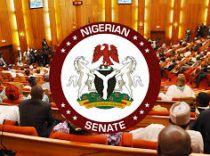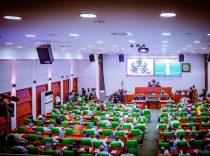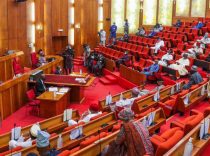The House at its plenary has voted on Constitution Alteration Amendment Bills after re-scheduling voting to today, Thursday, 27 July 2017. It will be recalled that the House had deferred voting yesterday due to the failure of its electronic voting system. Section 9 (2) of the 1999 Constitution, stringently requires that alteration Bills shall not be passed in either House of the National Assembly unless the proposal is supported by the votes of not less than two-thirds majority of all the members of that House and approved by resolution of the Houses of Assembly of not less than two-thirds of all the States. Therefore, the Constitution alteration process is generally facilitated by the electronic voting system that displays the number of lawmakers that vote in favour or against a bill and even includes those who choose to abstain.
Interestingly and as a departure from the Senate, the House voted on 34 Bills out of which 12 were rejected. Senate had voted on 33 Bills yesterday. The additional Bill was an amendment for a provision in the Constitution preventing a person who does not contest election from inception from being declared winner. In a similar voting pattern with the Senate, the House rejected a Bill guaranteeing the rights of married women to choose her indigeneship by birth or by marriage for the purposes of appointment or election and the Bill on devolution of power. However, the House supported a provision for 35% affirmative action for women. It is also noteworthy that while the Bill separating the office of the Accountant-General of the Federal Government from the Accountant General of the Federation passed, a similar Bill seeking to separate the office of the Attorney General of the Federation/State from the Office of Minister/Commissioner of Justice failed in the House. Both Bills had passed in the prior 4th Alteration Bill that was passed by the 7th Assembly but did not get Presidential assent.
There were also some additional amendments to the Bills presented. For instance the Bill seeking to alter the composition of the Council of States was further amended to prevent impeached Presidents and Chief Justices of Nigeria that have been forcefully removed from office from being a member of the council of state . Also, the approved Bill separating the office of the Accountant-General of the Federal Government from the Accountant General of the Federation was further amended so that the House of Representatives was included in the removal procedure. A two year tenure was also proposed for the accountant general of the federation.
Also, unlike the Senate, the Bills seeking to remove the NYSC Decree, National Securities Act and the Public Complaints Commission Act and the State Independent Electoral Commission from the Constitution was also rejected .
The full list of the Constitution Amendment Bills rejected by the House includes:
- Constitution of the Federal Republic of Nigeria, (Fourth Alteration) Bill, No. 3, 2017(Devolution of Powers) which seeks to alter the Second Schedule, Part I & II to move certain items to the Concurrent Legislative List to give more legislative powers to States. It also delineates the extent to which the federal legislature and state assemblies can legislate on the items that have been moved to the Concurrent Legislative List.
- Constitution of the Federal Republic of Nigeria, (Fourth Alteration) Bill, No. 7, 2017(State Creation and boundary Adjustment) which seeks to alter section 8 of the Constitution to ensure that only democratically elected local government councils participate in the process of State creation and boundary adjustment .It also removed ambiguities in the extant provisions to enhance clarity with respect to the procedure for state creation.
- Constitution of the Federal Republic of Nigeria, (Fourth Alteration) Bill, No. 23, 2017 (Citizenship and Indigeneship) which seeks to alter section 25 of the Constitution to guarantee a married woman’s right to choose either her indigeneship by birth or by marriage for the purposes of appointment or election.
- Constitution of the Federal Republic of Nigeria, (Fourth Alteration) Bill, No. 32, 2017 (Deletion of the Land Use Act from the Constitution) which seeks to alter the Constitution of the Federal Republic of Nigeria, 1999 to delete the Land Use Act from the Constitution so that it can be subject to the regular process of amendment.
- Constitution of the Federal Republic of Nigeria, (Fourth Alteration) Bill, No. 33, 2017 (Deletion of the State Independent Electoral Commission from the Constitution) which seeks to alter the Constitution of the Federal Republic of Nigeria, 1999 to delete the State Independent Electoral Commission Act from the Constitution so that it can be subject to the regular process of amendment.
- Constitution of the Federal Republic of Nigeria, (Fourth Alteration) Bill, No. 29, 2017 (Deletion of the NYSC Decree from the Constitution) which seeks to alter the Constitution of the Federal Republic of Nigeria, 1999 to delete the National Youth Service Corps Decree from the Constitution so that it can be subject to the regular process of amendment.
- Constitution of the Federal Republic of Nigeria, (Fourth Alteration) Bill, No. 30, 2017 (Deletion of the Public Complaints Commission Act from the Constitution) – The Bill seeks to alter the Constitution of the Federal Republic of Nigeria, 1999 to delete the Public Complaints Commission Act from the Constitution so that it can be subject to the regular process of amendment.
- Constitution of the Federal Republic of Nigeria, (Fourth Alteration) Bill, No. 31, 2017 (Deletion of the National Securities Act from the Constitution) – The Bill seeks to alter the Constitution of the Federal Republic of Nigeria, 1999 to delete the National Securities Act from the Constitution so that it can be subject to the regular process of amendment.
- Constitution of the Federal Republic of Nigeria, (Fourth Alteration) Bill, No. 25, 2017 (Removal of the Law-making powers of the Executive from the Constitution) which seeks to alter section 315 of the Constitution of the Federal Republic of Nigeria, 1999 to remove the law-making powers of the Executive Arm of Government.
- Constitution of the Federal Republic of Nigeria, (Fourth Alteration) Bill, No. 19, 2017(Separation of the office of the Attorney-General of the Federation and of the State from the office of the Minister or Commissioner for Justice) which seeks to alter sections 150, 174, 195, 211, 318 and the Third Schedule to the Constitution to separate the office of the Minister or Commissioner for Justice from that of the Attorney-General of the Federation and of states so as to create an independent office of the Attorney-General of the Federation insulated from partisanship. It also seeks to redefine the role of the Attorney-General, provide a fixed tenure, provide the age and qualification for appointment and also for a more stringent process for the removal of the Attorney General.
- Constitution of the Federal Republic of Nigeria, (Fourth Alteration) Bill, No. 13, 2017 (Change of Names of some Local Government Councils) which seeks to alter the Constitution to provide for change in the names of some Local Government Councils and the definition of the boundary of the FCT, Abuja.
- Constitution of the Federal Republic of Nigeria, (Fourth Alteration) Bill, No. 12, 2017 (Appointment of Minister from the FCT) which seeks to alter section 147 of the Constitution of the Federal Republic of Nigeria, 1999 to provide for the appointment of a Minister from the FCT, Abuja to ensure that the FCT is represented in the Executive Council of the Federation.
View the report that were considered by both Houses





